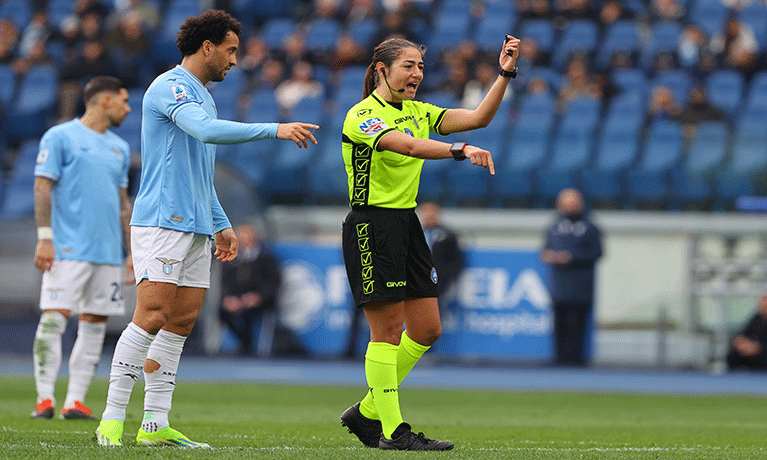Dr Tom Webb, Centre for Business in Society
Image features Maria Sole Ferrieri Caputi, Italian football referee.
The appointment of Rebecca Welch to officiate the Fulham versus Burnley fixture in the English Premier League on 23 December broke new ground for women referees in football. In taking charge of the fixture, Welch became the first woman to referee a men’s Premier League fixture. Of course, she has officiated many Women’s Super League fixtures and also officiated at the Women’s World Cup in the summer of 2023, but her appointment to the men’s Premier League competition could prove a watershed moment for women officials.
Women Referees
Women have been involved in refereeing men’s football matches before Rebecca Welch took charge of her first Premier League fixture. Sian Massey-Ellis has been a regular Assistant Referee in the men’s Premier League since December 2010, and also made history herself when she became the first English woman to officiate in a men’s European fixture in the 2020/21 season. However, these appointment and developments are essential given the wider issues that exist in football related to the recruitment and retention of referees, due at least in part, to the abuse that referees are experiencing from players, coaches and spectators.
WINS Project – Gender Equity in Sports Officiating
It is against this backdrop that an Erasmus Plus funded project, entitled WINS, was funded by the European Commission. WINS aimed to address gender equity in officiating across Europe by understanding and acting on the challenges and barriers and producing practical solutions that would affect and impact the current situation for women officials, and support organisations so that they could increase their recruitment and retention of women officials. The project ran from 2020 until December 2023 and involved a number of high-profile partners, including the European Observatory of Sport and Employment, European Athletics, Euro Hockey and the Dutch Olympic Committee.
The project produced an extensive European wide research report, led by Dr Tom Webb from the Centre for Business in Society (CBiS) at Coventry University, which was essential in allowing the project partners to understand some of the barriers and opportunities that exist for women sports officials across Europe. As part of the initial research phase of the project, a survey was launched, gaining 3264 responses from women officials in 64 different countries, as well as 14 interviews with high level administrators working for a variety of sports federations across Europe and each with a brief that included the recruitment or retention of women officials.
In addition to the findings from the research phase of the WINS project, other outputs provided a compendium of good practice case studies on the recruitment and retention of women sport officials, an online toolkit for the recruitment and retention of women sport officials and a mentoring and leadership guide for women sport officials in Europe. The online toolkit, in particular, is a new resource which has not been developed or provided anywhere else in the world. The toolkit is designed to be utilised by sport organisations, so that they can respond to the issues and challenges of engagement and retention of women sport officials, and provides extensive information and examples in the form of resources, as well as a self-assessment questionnaire for those using the toolkit.
Recruitment and Retention Crisis
This project and the coverage of an important topic such as the recruitment and retention of women officials, is extremely timely. As sports organisations grapple with an ongoing crisis related to officiating numbers, there is an urgent requirement to understand more about the barriers, challenges and opportunities for different demographic groups within officiating, such as women officials. Current research in this area is limited, although the WINS project has helped to advance our understanding in this area and there has been research which has examined women football referee’s experience of mental health and the experiences of women football referees related to gender stereotyping in English football. However, given the issues identified earlier around the recruitment and retention of officials across sports, an increased focus on engaging officials from different demographic groups and divergent backgrounds should be prioritised.
In football, UEFA are trying to attract 40,000 new referees every season across Europe, and in many sports governing bodies and federations are investigating methods to increase the recruitment and retention of officials. On International Women’s Day on 8th March, Dr Webb will be speaking at the Council of Europe in Strasbourg about his work around women sports officials and the recruitment and retention of officials in sport. Investing and focusing on groups from different backgrounds can mean that sports organisations not only diversify their workforce, but also potentially future proof their officiating workforce. The appointment of Rebecca Welch could and should be just the start.
Through understanding the impact of organisations’ activities, behaviours and policies, the Centre for Business in Society at Coventry University seeks to promote responsibility, to change behaviours, and to achieve better outcomes for economies, societies and the individual.




Comments are disabled